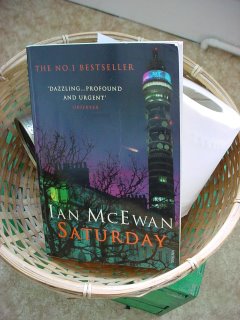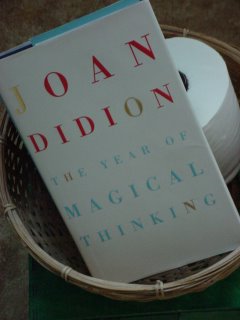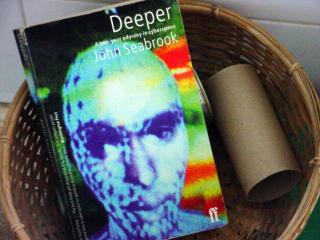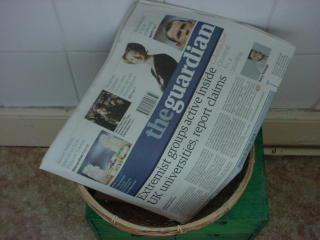Saturday by Ian McEwan
 A Day In The Life….Oh Boy!
A Day In The Life….Oh Boy! Meet Henry Perowne, a brilliant brain surgeon and his wife Rosalind, a brilliant media lawyer for a national newspaper. Say hello to their son Theo, a brilliant blues guitarist (with lessons under his belt from the rather brilliant Jack Bruce no less), and daughter Daisy. She’s a precocious poet on the cusp of a brilliant career following in the footsteps of grandfather, John, who is arguably more brilliant than the lot of them put together.
Yes, it’s the everyday tale of Fitzrovia folk going about their business on a Saturday. For Henry that means a game of squash with his brilliant colleague Jay Strauss, a visit to the fishmongers ahead of a family get together in the evening and calling in on his ailing mother in her nursing home where she is lost to Alzheimer’s.
Well that’s the plan but as he stands in the pre-dawn gloom of his well-appointed town house, Perowne witnesses a stricken plane blazing a trail across the still-black sky like a comet. From the moment he sees this post-modern omen of ill-will, Henry’s day begins to go wrong.
This isn’t any ordinary Saturday. February 15th 2003 saw London gridlocked with a huge anti-war demonstration, blocking Henry’s usual route to the squash court, and giving rise to the book’s inciting incident - a prang with an opposing car full of people you’d rather not know.
Perowne seems certain to get a damn good thrashing. However thanks to a quick-witted street diagnosis of an incurable and terminal neurological condition, his hastily improvised bedside manner befuddles the oiky antagonist. With one bound Henry is free, niftily sidestepping the bruiser called Baxter for the cream leather safety of his Mercedes.
Putting some distance between him and the thwarted roughnecks, Perowne has to navigate his way around the anti-war demo before finally transferring his adrenalin to his game of squash. Here an altercation of a different kind is worked out as Perowne plays dove to his sporting opponent’s hawk when discussing the impending war.
If the pages lavished upon the squash game were a metaphor for the game of political hardball taking place between the UN and Washington at the time, it was laboured and vaguely ludicrous. If instead it was meant to symbolise Henry’s diminishing potency with the onset of middle-age then it was simply dull beyond belief.
When later, Henry flip-flops position on how best to deal with bad guys like Saddam, McEwan articulates the angst of many who believed that his regime had to go but didn’t think that the means justified the ends.
Yet the use of the demonstration, and the extent to which it impinges on Henry’s world, appears gratuitous, contextual padding to make a fairly thin tale more socially and politically relevant than it might otherwise be.
Perhaps the clinical way in which it’s dealt with is also meant to be a metaphor concerning Perowne himself. McEwan’s extensive research (shadowing a real neurosurgeon for two years) should have brought Henry’s day job of delving into other people’s cranium vividly alive but curiously fails.
Characters with flaws make for fascinating fiction. Yet it’s hard to get worked up about someone as dry and as bland as Henry, about whether or not, all things considered, his famous fish stew would be a success that night or not.
Where things truly come to life is with the two characters in the book who are clearly anything but brilliant; Baxter and Henry’s mother.
Both have in common brains afflicted by inoperable diseases, and both strip away Henry’s layers of emotional and intellectual insulation rendering him vulnerable and only then, interesting.
Chronicling the pitiful dissolution of personality and possessions as his mother’s Alzheimer’s takes its relentless toll shows McEwan at his heartbreaking best. Though it occupies relatively little of the book, the writing smoulders a palpable sense of loss. It’s no surprise to discover McEwan’s own mother suffered from the condition.
Which leaves us with the bad lad Baxter.
In his autobiography, Owning Up (first published in 1965), George Melly tells a good story about being cornered by a group of hard cases after a gig in
From out of his jacket he brandished a copy of poems by Dadaist Kurt Schwitters.
Now it’s well known in self-defence circles that a rolled up newspaper can be a lethal weapon, but instead of using the poems to crush his opponent’s windpipe, Melly began loudly declaiming the onomatopoeic verse therein, causing his startled aggressors to back off.
If calming the barbarian at the gates with nifty ninja-style poetics worked for George Melly, then why not something similar for Henry?
This is exactly the device McEwan employs when Baxter and his simian chums invade the Perowne’s house later that evening, only here Schwitters is substituted for Mathew Arnold. Given the smog of smugness circulating in that room, I found myself frustrated that their nemesis didn’t cut through it all and wipe out the lot of them.
There’s no doubting that McEwan’s more than a bit brilliant himself but Saturday suggests he’s cruising.









